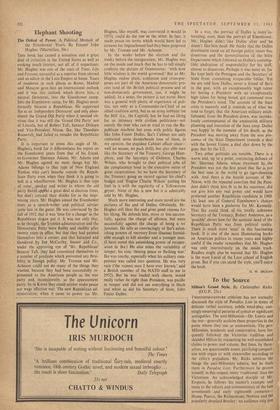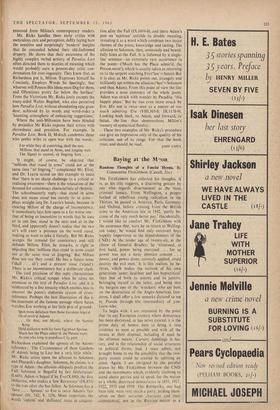To the Source
Milton's Grand Style. By Christopher Ricks. (O.U.P., 25s.) Milton's Grand Style. By Christopher Ricks. (O.U.P., 25s.)
TWENTIETH-CENTURY criticism has not normally discussed the style of Paradise Lost in terms of delicate verbal accuracy, subtle word-play, cun- ningly meaningful patterns of syntax or significant ambiguities. The anti-Miltonists—Dr. Leavis and the rest—generally acclaim these properties in the poets whom they use as ammunition. The pro- Miltonists, academic and conservative, have fre- quently followed the Victorian tradition and shielded Milton by reasserting his well-established claims to power and volume. But these, by them- selves, are questionable assets, justifying compari- son with organ or with steamroller according to the critic's prejudices. Mr. Ricks admires the things the anti-Miltonists admire, but he finds them in Paradise Lost. Furthermore he proves himself, in this respect, more 'traditional' than the Victorians. An acknowledged disciple of Mr. Empson, he follows his master's example and turns to the editors and commentators of the late seventeenth and early eighteenth centuries-- Hume, Pearce, the Richardsons, Newton and the popularly despised Bentley : an audience only just
removed from Milton's contemporary readers.
Mr. Ricks handles these early critics with meticulous care and perception, deftly laying bare the sensitive and surprisingly 'modern' insights that lie concealed behind their old-fashioned drapery. He shows that their awareness of the highly complex verbal artistry of Paradise Lost often directed them to niceties of meaning which wottld probably earn a present-day critic con- demnation for over-ingenuity. They knew that, as Richardson put it, Milton 'Expresses himself So Concisely, Employs Words So Sparingly, that whoever will Possess His ideas must'Dig for them, and Oftentimes pretty far below the Surface.' From the Victorians Mr. Ricks justly excepts the many-sided Walter Bagehot, who also perceived how Paradise Lost, without abandoning epic gran- deur, achieved by its words and word-order a 'haunting atmosphere of enhancing suggestions.'
Where the anti-Miltonists have been blinded by prejudice Mr Ricks exposes their errors with shrewdness and precision. For example, in Paradise Lost, Book H, Moloch condemns those who prefer wiles to open war with the, words: - For while they sit contriving, shall the rest.
Millions that stand in Arms, and longing wait The Signal to ascend, sit lingring here . . .
'It might, of course, be objected that "millions that stand in arms" could not at the same time "sit. fluting," ! complained Mr. Eliot; and Dr. Leavis seized on this example to insist. that 'there is •no sharp challenge to a critical or
realising awareness,---there is the relaxation of the
demand for consistency charactefistic of rhetoric.' The schoolmasterly reply—that stand in arms 'does not mean stand. but merely .be in arms--- :plays straight into Dr. Leavis's hands, because in clearing Milton of the charge of inconsisttncy, it immediately lays him open to a far worse one: that of being so insensitive to words that he uses' sit in one line, stand in the next and sit in the
third, and apparently doesn't realise that the two
sit's will exert a pressure on the word ,,rand, .making us want to take it literally. But Mr Ricks ' accepts the remand far consistency and still defends Milton. Eliot, he remarks, is right in
objecting that 'millions that stand ha arms could
not at the 'same time sit Lingring.' But Milton does not say they could. He has a future tense ('shall . . . sit') and a present tense (Stand).
There is no inconsistency but a deliberate clash. The cool precision of this reply characterises Mr. Ricks's critical temper when he turns his attention to the text of Paradise Lost, and it is reinforced by a fine tenacity which enables him to uncover the poem's elaborate system of cross- referehce. Perhaps the best illustration of this is his treatment of the famous passage where Satan watches Eve working at her little plot of ground: • Spot more delicious then those Gardens leign'd OpOf reviv'd Adonis . .
. . . Or that, not Mystic, uhere the Sapient King Held dalliance with his faire Egyptian Spouse. Much hee the Place admir'd, the Person more.
As one who long in populous City pent Richardson explained the aptness of the Adonis reference: 'The Circumstance of these Gardens of Adonis being to Last but a very little while.' • Mr. Ricks seizes upon the allusion to Solomon and Pharaoh's daughter. Solomon, he claims, is a type of Adam : the allusion obliquely predicts the Fall. Solomon is 'Beguil'd by fair Idolatresses' (1.445): Adam is 'begun]. by Eve (X.880), the first idolatress, who makes a 'low Reverence' (1X.835) to the tree after she has fallen. As Solomon has a 'faire . . . Spouse,' so Eve is twice Adam's 'fair spouse' (IV. 742; V. 129). More important, the swords 'sapient' and 'dalliance' recur in conjunc- tion after the Fall (1X.1016-8), and there Adam's pun on 'sapience' unfolds its double meaning, revealing it as a word which combines two major themes of the poem, knowledge and tasting. The allusion to Solomon, then, ominously and beauti- fully hints at•the Fall. It is followed by a single- line sentence—an extremely rare occurrence in the poem—('Much hee the Place admir'd, the Person more'), which: is usually taken as returning us to the 'serpent watching Eve ('hee'=Satan). But it is also, as Mr. Ricks points out, strangely and brilliantly apt within the allusion ('hee=Solomon • • and thus Adam). From this point of view the line • provides a terse summary of the whole poem. Adam was struck with wonder by Paradise, 'this happie place.' But he was even more struck by Eve. His son is twice seen as a matter of too much admiring Eve (VI11.565-8; 1X.1178-9). Looking both back, ,to Adam, and forward,'.fo Satan, the line thus demonstrates MiltOn's
• mastery of syntactical fluidity.. , • ' These two examples of Mr.' Ricks's procedure can give an impression only 'of the quality of his criticism, not of its range:. For that the- book • must, and should, be read.
count CAREY































 Previous page
Previous page